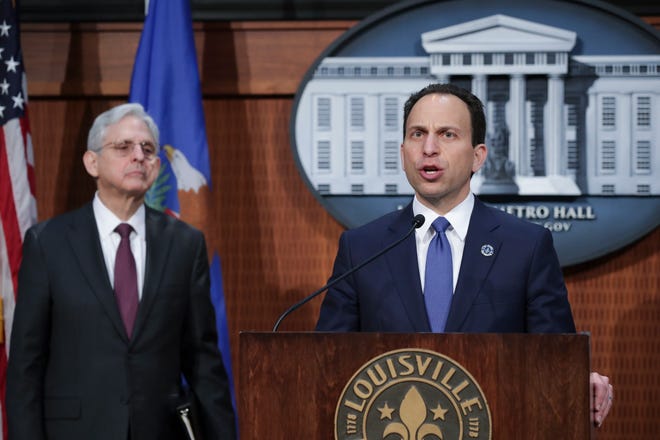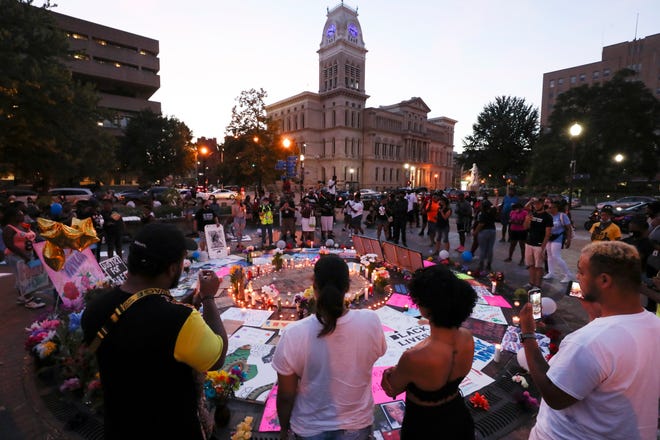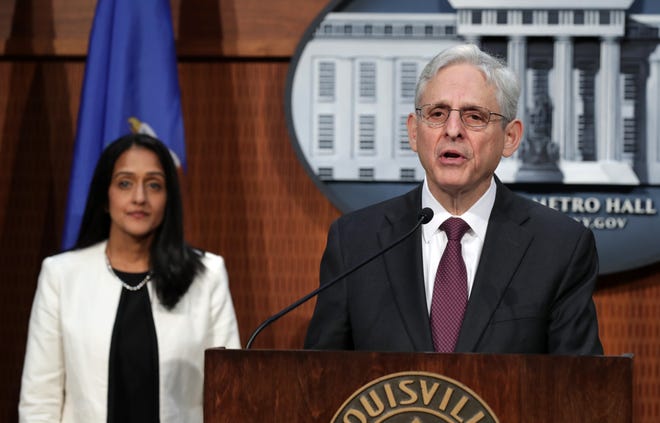DOJ investigation into Louisville police: What happens now with a consent decree
The settlement in principle to negotiate a consent decree announced Wednesday between the U.S. Department of Justice and the city of Louisville could put LMPD under a microscope for years to come. The agreement comes after the Department of Justice released its investigative report, finding reasonable cause to believe the city and Louisville police "engage in a pattern or practice of conduct that deprives people of their rights under the Constitution and federal law."In Seattle, where a consent decree was issued in 2012 after a Native American wood carver was shot to death by police when crossing the street in front of a cruiser, the court-enforced accord is still in force 13 years later. And it has cost taxpayers $100 million.The first step in Louisville will be for the city to finalize its agreement on police reforms with DOJ’s Civil Rights Division, Louisville Mayor Craig Greenberg said Thursday. He and Justice Department officials said they will continue to seek recommendations from residents and police. When it is finalized, the consent decree will be submitted to a federal judge for enforcement. More:What to know about the 7 DOJ findings in Louisville police investigationThe court will select a monitor — usually a lawyer or a retired police official from another jurisdiction ― to report on the city’s progress, U.S. Attorney General Merrick Garland said. The monitor, who will issue periodic reports to the court and the public, could recommend the end of federal government supervision when the city is in compliance. The DOJ’s report, which found LMPD uses excessive force and discrimination against Black residents and the mentally ill, among other problems, recommended 36 remedial measures, which suggests it will take time for the city to achieve compliance.If Seattle, where 500 officers left the department in the years after its consent decree went into effect, is any guide, the agreement in Louisville is likely to generate opposition and resistance among rank-and-file officers. The DOJ's Civil Rights Division has conducted hundreds of preliminary inquiries into police departments and at least 73 formal investigations since 1994, when Congress gave it that authority. Targets have included police departments from Buffalo to Beverly Hills, including those with as few as six officers and as many as 1,700. Conservatives and police have attacked the decrees. Then-President Donald Trump called them a “war on cops,” and his first attorney general, Jeff Sessions, said they were a “dangerous ... exercise of raw power” and an “end run around the democratic process.”But policing experts last year told The Courier Journal they are the most powerful tool for police reform in the United States. They cited empirical evidence that they work, resulting in fewer police-officer caused fatalities, less use of force and fewer civil rights suits filed against departments and officers.'It's heartbreaking':Breonna Taylor's mother says DOJ report shows what we already knewThe Center for American Progress, an independent, nonpartisan policy institute, found last year that in all 10 departments it analyzed, violent crime rates declined in the years after they fulfilled reform agreements and were released from consent decrees.In Seattle, serious use-of-force incidents declined 63% eight years after it began functioning under a consent decree, according to a 2019 report from the mayor’s office. But officials there and elsewhere caution that decrees are just one tool not, not a cure-all. Seattle Council member Lisa Herbold, who chairs the department's public safety committee, noted that per capita, Native Americans in 2021 were stopped nearly nine times as frequently as white people, and Black people were stopped over five times as frequently as white people. And she said despite the consent decree, police shootings of people experiencing mental health crises and armed only with knives had continued.



